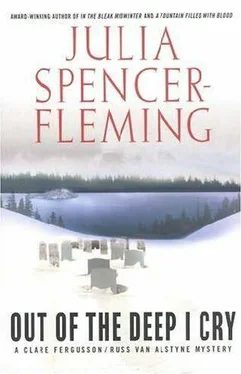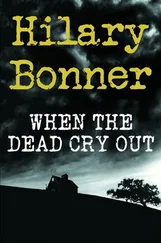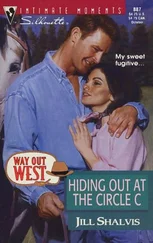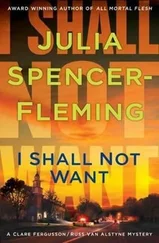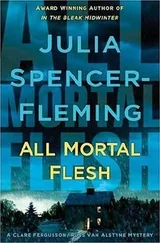Ketchem gripped his hand a little too tightly. “Do you really think-,” he said, his voice shrunken, then shook himself and released Harry’s hand. “I’m sure he’ll turn up soon,” he said, in a normal tone. “And when he does, I’ll be first in line to kick his keister for making us worry.”
“I’m sure you’re right,” Harry said.
Pulling out of the gas station and turning onto the road back to Millers Kill, Harry could see David Ketchem had gone to his son’s side. He watched them in his rearview mirror, watching him, until they disappeared in the distance, Ketchem’s arm wrapped tight around his son’s shoulders. Keeping him safe at home.
NOW
Monday, March 20, The Feast of St. Cuthbert, Bishop of Lindisfarne
Did you ever find out what happened to your father?” Clare shifted in the passenger seat of Mrs. Marshall’s Town Car, taking pains not to move the dish towels shielding her thighs from the hot casserole dish balanced on her lap. She had wheedled her way onto the delivery, in part because she had a guilty need to extend her sympathy and support to Allan Rouse’s wife, and in part because she didn’t know, if she cut off the tale in its telling, if Mrs. Marshall would ever open up this way about her family again.
“No. Although there was no lack of theories. My mother was convinced he was dead, though she never speculated whether it was by accident or some misadventure.” She glanced away from the road briefly, smiling an old smile. “I suspect it was easier for her for him to be dead than for him to be alive somewhere, making a new life without us.”
“How about you?”
“When I was a girl, I was definitely in my mother’s camp. I was sure he had been set upon by brigands and murdered after fighting like a lion to escape. Later, as an adult…” She flicked on her turn signal and swung the car majestically onto Main Street. “I came to believe he ran away. He certainly wasn’t the only man to take that way out during the depression. I didn’t notice it much as a little girl, but those were hard times. The year he disappeared, two of the four banks in town closed. I remember the Ladies Auxiliary started coming by my school with box lunches because some children had nothing but a hard roll or an apple to eat. I found out later, from my grandmother, that by the time my father had been ruled dead, his life insurance was gone. The company went bankrupt. That happened far too often in the thirties.” The light turned red a block ahead of them, and Mrs. Marshall braked, reducing the speed of the boat-sized car from thirty-five miles an hour, to twenty-five, to something Clare could have matched during a good run. Clare tried not to twitch.
“How did you and your mother get on without your father? Did she have a job?”
They were still slowing down when the light turned green again. “No, Mother never worked. Of course, few women did, even in those days. There was so much more work to do at home than there is now, you know. It was hard for her, but she always managed to pinch by. She had investments. She and my father helped Uncle David start his garage, and that certainly did well over time. We never had luxuries, but I never wanted for anything important. And when the time came, I was able to attend college. I was the only girl in my high school class to do so. That was before the GI Bill and student loans and all that.”
“Where did you go?” Clare asked, imagining one of the state universities or subsidized colleges.
“Smith. Class of ’47.”
Clare blinked. “Good school. Were you a work-study student?”
“No, Mother paid for it all.” She risked another glance at Clare before returning her attention to the road. “She never spent anything on herself. Everything she had she spent on me, and then on the clinic, and then it went into the trust at her death.”
Clare opened her mouth to point out that Jane Ketchem hadn’t done too badly for a woman with no job and no visible means of support, but her grandmother Fergusson hissed in her ear, Nothing’s more vulgar than talking about money! So she snapped her jaw shut and watched as they turned with great deliberation onto Elm Street.
Several cars were parked along the street in front of the Rouses’ house, including, Clare noted with no surprise, the chief of police’s pickup truck. Mrs. Marshall pulled in as close as she could, and Clare juggled the casserole dish out of the car while Mrs. Marshall retrieved a cherry pie-“Store bought, I’m afraid”-from the backseat.
This time, Clare didn’t have a chance to admire the deep moldings and polished brass on the Rouses’ door. The minute Mrs. Marshall set foot on the steps, it whisked open, revealing a little pear-shaped woman with a face like a homemade dumpling. “Lacey Marshall, you be careful on those steps,” she said, reaching for the pie. “Give me that. Come on in. Oh, is that a casserole? How nice. Renee will be set for a few days at this rate. Which’ll be a help. Although you know, sometimes puttering around in the kitchen can be a relief from thinking about your problems. Oh! Who is this?”
During the course of the monologue, Clare had followed Mrs. Marshall into the foyer, set the casserole dish on a marble-topped commode that had probably stashed mittens and hats in the Rouses’ child-rearing days, and unwound her scarf from around her neck.
“Yvonne, I’d like you to meet the Reverend Clare Fergusson, our priest at St. Alban’s. Clare, this is Yvonne Story. Yvonne was our librarian at the Millers Kill Public Library until she retired, much to our loss.”
“Oh, I had to retire in order to fit in all the other things I was doing at the time. Not that I didn’t love being librarian. Everyone always said it was a natural fit, a librarian named Story.” She snorted at her own joke. “So nice to meet you. I’d heard the Episcopalians had a new minister. I used to be a Methodist myself. But when Dr. Gannet left, it all went straight downhill. That new fellow couldn’t preach his way out of a paper sack. So I abandoned ship. Now I watch this nice television preacher. So much easier than getting up and dressed on a Sunday morning!”
Clare tried to squeeze in a how-do-you-do while Yvonne Story pumped her hand, but it was futile. She settled for smiling and nodding.
“Isn’t this terrible about poor Allan? I mean, I hate to assume the worst. But there’s not much of a way you can put a good face on this, is there? Poor Renee. I hope he left her well set up. She’s never had to work, like me. What will she do without him? That’s the downside of having a husband. That’s why I never got married.”
Clare felt her smile glazing over. Deliver me, O Lord, she prayed.
“Yvonne.” Renee Rouse appeared in the doorway between the front hall and the living room. “Would you be a dear and go make some more coffee? And a pot of tea. I’m sure everyone would like something warm on such a cold day.”
“Oop. Of course, Renee. And I’ll put this pie in the kitchen for you, Lacey. Did you get it from the IGA? They do nice pies. Not as good as homemade, mind you, but good.”
“Thank you so much, Yvonne,” Mrs. Rouse interrupted.
“Oh, you’re right. To the kitchen for me. Ta-ta. See you later. Nice meeting you, Reverend.” She continued to talk as the door to the kitchen shut behind her. Clare took off her coat and hung it in the hall closet. The librarian?
Renee Rouse closed her eyes. She was holding the edge of the archway, her knuckles white.
“How long has she been here?” Mrs. Marshall asked.
“Since nine.” Mrs. Rouse tried to smile.
Mrs. Marshall picked up her casserole. “I’ll pop into the kitchen and keep her occupied for a bit.”
Читать дальше
